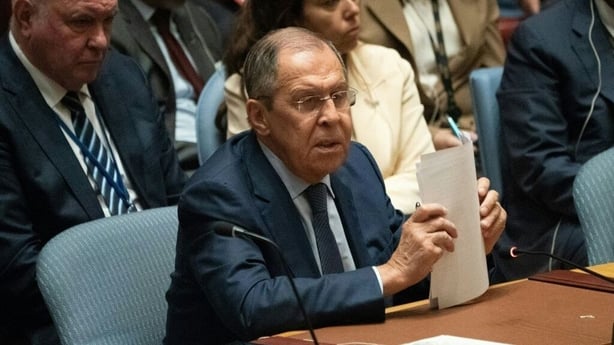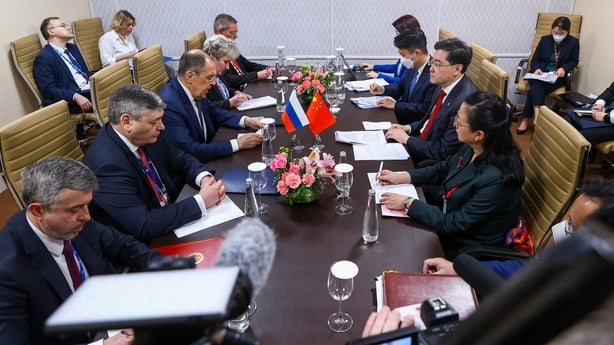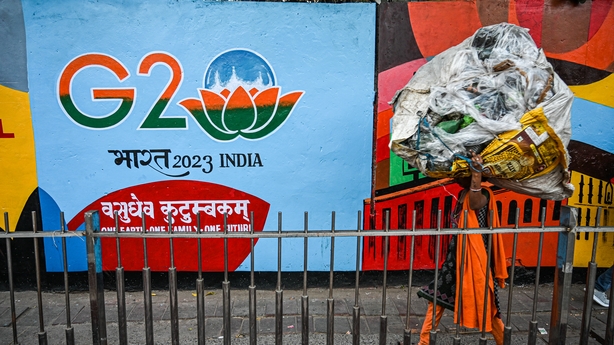The United States and Russia have met in their highest face-to-face contact since the invasion of Ukraine last year on the sidelines of a Group of 20 (G20) meeting that ended in disarray due to divisions over the conflict.
US Secretary of State Antony Blinken and Russian Foreign Minister Sergey Lavrov spoke briefly at the meeting of the world's top diplomats in India, which failed to reach a joint final declaration after objections from Moscow and Beijing.
Mr Blinken reaffirmed Washington's commitment to protecting its ally Ukraine in order to "disabuse the Russians of any notion that our support might be wavering", a US official said.
Mr Blinken also told Mr Lavrov to end the war and urged Moscow to reverse its suspension of the New START nuclear treaty.
The Russian foreign ministry said Mr Lavrov and Mr Blinken spoke "on the move" for less than ten minutes at the end of the closed-door session, and did not engage in any negotiations, Russian news agencies reported.
Mr Blinken later told a news conference he had told Mr Lavrov to engage in diplomacy during the unscheduled encounter.
The last time Mr Blinken and Mr Lavrov were in the same room - at a G20 meeting in Bali last July - the latter stormed out, according to western officials.
Until today, there had been no high-level face-to-face contacts between the US and Russian governments since Moscow invaded Ukraine in February 2022, with Washington firmly backing Kyiv and spearheading international efforts to isolate Russia.
Russian diplomatic spokeswoman Maria Zakharova sought to downplay the significance of the encounter, telling state news agency RIA Novosti that Mr Blinken had initiated it and that it had been fleeting.
Mr Lavrov "spoke to him, standing, as part of the second second session of the G20," she said. "No talks or real meeting took place."

The G20 meeting drew to a close without a joint statement - the second such meeting of the group to fail to reach an accord in as many weeks.
Mr Lavrov told the assembled foreign ministers that western representatives had derailed the meeting in an effort to scapegoat Russia for their own failings, disrespecting efforts by the Indian hosts to reach agreement on other issues.
"I want to apologise to the Indian presidency and to our colleagues from countries of the global south for the obscene behaviour of some western delegations, which have turned the G20's agenda into a farce," Mr Lavrov said, according to Russian news agency TASS.
Discussions over the joint statement faltered on several issues including Russia's insistence on an investigation into the sabotage of the Nord Stream pipeline last year, Mr Lavrov told reporters through an interpreter.
Russia and Western countries have traded accusations of responsibility for the September explosions.
A statement issued at the conclusion of the G20 meeting showed China had joined Russia in refusing to support the bloc's demands that Moscow cease hostilities in Ukraine.
Both countries were the only G20 members not to agree to the statement demanding Russia's "complete and unconditional withdrawal".
A meeting of G20 finance ministers in Indian city Bengaluru last week had also failed to agree on a common statement after Russia and China sought to water down language on the war.
Western delegates fear China is considering supplying arms to Russia and said ahead of the summit they intended to discourage Beijing from intervening in the conflict.
Since Russia's invasion of Ukraine, China has framed itself as a neutral party, while retaining close ties with its strategic ally Russia.
Beijing has reacted furiously to the claims it may be contemplating arms transfers, and in February it issued a position paper calling for dialogue to resolve the conflict.

Russia's war in Ukraine crowded out other agenda items at the meeting of the G20, which comprises the world's 19 largest economies and the European Union.
The differences frustrated India, which said it wanted to use its year as host to focus on issues such as alleviating poverty and climate finance.
"On the issue, which very frankly concerned the Ukraine conflict, there were divergences, there were differences, which we couldn't reconcile," Indian Foreign Minister S Jaishankar told reporters as the meeting concluded.

Earlier in the day, Indian Prime Minister Narendra Modi said global governance had "failed" and urged attendees to come together for the sake of developing countries not represented there.
"As the leading economies of the world, we also have a responsibility for those who are not in this room," he added.
While India shares western concerns about China, it is also a major buyer of Russian arms and has ramped up Russian oil imports.
India has not condemned the invasion of Ukraine, but Mr Modi told Russian President Vladimir Putin last year this was "not a time for war".

